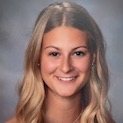
Field Hockey, Lacrosse
Favorite athlete: Simone Biles
Favorite team: Philadelphia Eagles
Favorite memory competing in sports: My Senior Night for field hockey and lacrosse.
Most embarrassing/funniest thing that has happened while competing in sports: An opponent was (rudely) asking why I was wearing a helmet on Senior Night, and all my friend said was – “She has cancer” and then walked away…the face on the opponent was priceless.
Music on playlist: A mix of every genre
Future plans: Fertility doctor
Words to live by: “Can’t change the past, so focus on the future.”
One goal before turning 30: Start a family
One thing people don’t know about me: My elbows are double-jointed.
By Mary Jane Souder
Senior Night.
It’s a night eagerly anticipated and undeniably special, a night when seniors are honored for their contributions over the years. Belle Sparango was more eager than most for her North Penn lacrosse team’s Senior Night this spring, but the script didn’t exactly go as planned.
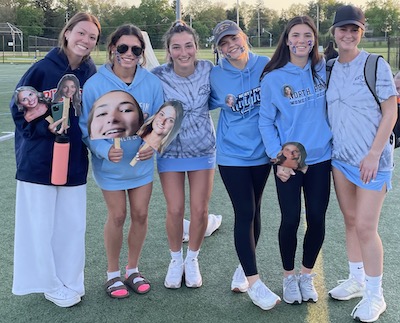 “About an hour before the game, all the seniors were taking pictures in our friends’ Jeep,” the recent North Penn grad said. “We were all on the roof, and for the picture, we needed to close the door, and my finger got slammed in the door. I broke my finger an hour before the game. I was bawling my eyes out because it hurt but more because I was like, ‘I need to play, I have to play. This is my one chance.’”
“About an hour before the game, all the seniors were taking pictures in our friends’ Jeep,” the recent North Penn grad said. “We were all on the roof, and for the picture, we needed to close the door, and my finger got slammed in the door. I broke my finger an hour before the game. I was bawling my eyes out because it hurt but more because I was like, ‘I need to play, I have to play. This is my one chance.’”
Sparango was not about to let a broken finger keep her out of the game. Not after being sidelined her entire senior lacrosse season, waging a war against an unimaginable opponent - lymphoma.
North Penn lacrosse coach Heather Mellow remembers the night well.
“Her finger was huge, it was cut - it looked like it was broken,” the Knights’ coach said. “I’m like, ‘There is no way you’re about to finally play.’
“It was a little bit of excitement before the game. She was like, ‘I don’t care, just tape it up. I don’t care if you have to tape it to the stick. I’m playing.’”
And play Sparango did.
“That is her personality - she went in there, scored three goals and had an assist – she did amazing,” Mellow said. “She played a good portion of the game.”
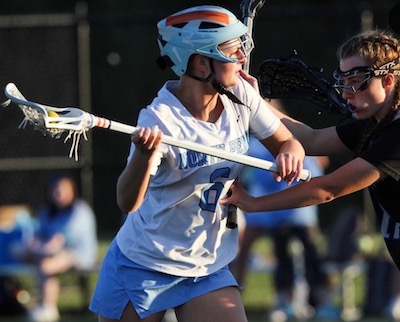 “I was so excited,” Sparango said. “I got it taped up, and Mellow was like, ‘Are you good?’ I was like ‘I’m good,’ and then I went in. It felt amazing.”
“I was so excited,” Sparango said. “I got it taped up, and Mellow was like, ‘Are you good?’ I was like ‘I’m good,’ and then I went in. It felt amazing.”
Amazing undoubtedly doesn’t even begin to describe the experience.
“I felt more alive than I’ve felt in ages just to be with my friends and to do the sport I love and I’ve missed out on and just to have fun and just do it,” Sparango said.
The senior attack player – wearing a helmet and ignoring her broken finger – played with passion and determination, capping her senior year that took an improbable turn last fall.
“It was just like – man, look what you did,” Mellow said. “You’ve gone through it all, and you’re able to get out there and still able to do whatever you wanted to do. You’re still able to do this.
“How do you not rally around someone going through something like that. It doesn’t matter whether they’re a difficult kid or not, but when it’s someone you love so much that you’re watching suffer and go through these trials as an adolescent, it’s heartbreaking. A teenager having to go through that after already having gone through COVID and losing a couple of years to that. To lose your senior year essentially and a lot of the fun things that go along with it. That is not easy.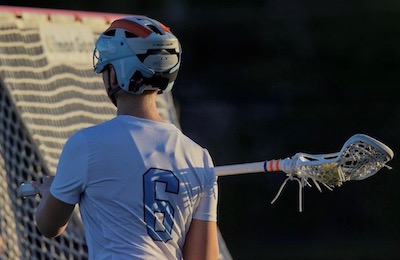
“She’s had her ups and downs, you can see that. There were days going through radiation, and she’d say, ‘I just can’t make it to practice today.’ Honestly, just her showing up was a highlight. If she could show up, great. If she couldn’t, it wasn’t a big deal. We just wanted her to know she was part of the program, good or bad, whatever the situation.”
Sparango’s story is one of resiliency and courage and an indomitable human spirit that would not be broken.
And so it begins
Belle Sparango was every girl.
The recent North Penn graduate played pretty much every sport as a youngster but fell in love with field hockey and lacrosse. She went on to become a key member of both the hockey and lacrosse squads and also excelled in the classroom, boasting a rigorous schedule that was packed with honors and AP classes. She was a member of National Honor Society and also was involved with Special Olympics and Unified Sports. She spent her summers working as a lifeguard.
Sparango, like all of her classmates, was looking forward to the return to normalcy last fall after two years of high school altered dramatically by the COVID 19 pandemic. And everything was going smoothly. Even when her life was interrupted by a bout with COVID in September that sidelined her for 10 days, it was hardly cause for concern except she had several nagging symptoms.
“When I came back to field hockey, I remember having a conversation with our athletic trainer and my coach – I was like, ‘Hey, I’m having shortness of breath, I’m having a hard time doing the conditioning, the running on the field. I think it’s just a side effect of COVID because that’s one of the things it can give you,’ so they monitored me,” Sparango recalled. “Another thing was – I would all of a sudden just cough. That was definitely bizarre, but I passed it off as COVID.
“When I originally went to my doctor to ask about the shortness of breath, she said, ‘Oh, that’s a COVID thing. It will go away.’ She kind of passed it off. It was weird, but then again, COVID is an unknown thing. They really don’t know anything further about it. I was like, ‘Okay, whatever, we’ll just see how it goes,’ but I kind of knew something was wrong.”
Sparango finished out her final field hockey season.
It wasn’t until she took a spin class with a friend – her very first - that she noticed something that raised a red flag.
“I was wiping the sweat off my neck, and there were lumps,” Sparango said. “I went back to my pediatrician, and she didn’t really know what it was. At first, she thought it was mono, but my throat was fine. I wasn’t sick like that, so she sent me to get a chest x-ray. I went right after I went to the doctor. There was a lymph node about the size of a baseball surrounding my trachea, so that’s where the shortness of breath was coming from. That’s when the radiologist called my mom and was like – she needs to go to CHOP.
“My mom had thyroid cancer a few years ago, and she found a lump on her neck. When I felt those lumps, and I showed my mom, it was kind of like, an ‘oh crap’ moment. When the radiologist called my mom, telling me I needed to go to the ER – this sounds weird, but I actually kind of laughed. I was like, ‘I don’t know how to handle this,’ so laughter came out.”
That phone call – on a Friday - marked the beginning of a life-changing week.
“We went to Einstein in Norristown, and it was mobbed,” Sparango said. “We were like, ‘We’ll go to CHOP tomorrow morning because I would go there anyway.
“I went Saturday morning, Nov. 13. The 15th I had a meeting with one of the doctors who said ‘It’s probably lymphoma, here’s the schedule.’ The 17th I got an echo of my heart, PET scan was the 19th, and a port was put in sometime around there. I didn’t really think it was real because in a span of one week, I had a bunch of tests, a neck biopsy, and a port put in. It was like, 1-2-3 boom. I was like, ‘Oh crap.’”
Shannon McCracken, Sparango’s field hockey coach at North Penn, was stunned by the news.
“She just has a positive demeanor – she was even so positive when she got the news,” the Knights’ coach said. “When they took images, there was a baseball size tumor on her trach. I could not believe it because she didn’t exhibit any type of symptoms. Even the breathing issue, she really worked through it. I didn’t think she was a step behind any of the kids.
“She was always aggressive to the ball, she was a hustler on the field. One of her goals this year – it was one of my favorite goals of the season. The goalie batted it back at her – the ball was in the air, and she hit it in. I couldn’t believe she put it back in.
“I was shocked when her mom sent me the email. I can’t believe she went through an entire season while her body was battling this. Field hockey is an intense sport. It just speaks to her character and the kind of kid she is. She’s the type of kid that had the perseverance already.”
Sparango’s hockey team had t-shirts made with ‘Belle Strong’ emblazoned on them. Along with countless other shows of support, they also took a collection and purchased gift cards to assist the family.
“Her teammates were taken aback - you think these things happen to other people and not someone your age,” McCracken said. “They were super supportive.
“That’s what’s so great about being on a team and in a community – when someone is in need, everyone embraces them.”
An unexpected journey
Sparango’s diagnosis marked the beginning of an improbable journey that included 12 weeks of chemotherapy and 12 more of radiation, a stretch that ended with her final radiation treatment on June 3.
“By the time I got diagnosed until I started the chemo was about two-and-a-half weeks – it was fast,” Sparango said. “Reality didn’t hit me until the surgeries started – the neck biopsy, a port. I got a double bone marrow biopsy – in both my hips.
“We had a meeting with my oncologist and a bunch of nurses to go over the plan for chemo. My number one thing was – I didn’t want to lose my hair, I didn’t want to miss a bunch of school, so I expressed that to my oncologist, and he was like – ‘You’re going to lose your hair, you’re going to miss school,’ and that’s when it hit me where I just emotionally broke down.”
But Sparango didn’t stay down, and in preparation for the inevitable, she became proactive. She had her long hair cut to shoulder length and had a halo wig made out of it.
“The top of it is open, and you wear hats with it, and my hair is just at the bottom,” Sparango explained. “It was in the winter, so I wore a lot of hats, which was perfect.”
Faced with what lie ahead, Sparango had an important conversation with her parents.
“My dad said, ‘Listen, you can either let this break you or you can fight it, and you can put up the best fight you ever have,’” she said. “I remembered that, and I stuck with that – it is what it is.
“I can’t change what’s coming at me. I can’t do anything about it. The only thing I can do is keep a positive attitude and just fight it like hell, and that’s what I try to do. I try to keep a positive mindset the whole time.”
Sparango was forced to drop classes to accommodate her treatments and the inevitable side effects.
“I had a full schedule, and it got to the point where I only had two classes that I went in for occasionally,” she said. “I would see my friends going to lunch, going about projects in the classes I was in or hanging out after school, and I was just kind of sitting there. It was rough to see everyone out there caring about their lives and I was doing nothing in school.”
While chemotherapy was part of the initial treatment plan, radiation was a question mark dependent on Sparango’s marks after three months of chemo – four rounds of three weeks each. She received chemo on days one, two, three and eight of each cycle.
“Days one, two and three definitely made me sick, but not too, too bad,” she said. “I would go home on a bunch of meds and just sleep. The eighth day I had to do in-patient because that made me super sick, and I stayed in the ER and the oncology wing for about four days each time.”
Scans were taken to determine the chemo’s effectiveness after two rounds and then again after four rounds.
“After two rounds, they told me everything looked great – the chemo was working, all the lymph nodes had shrunk and that I didn’t need radiation,” Sparango said. “I hit all my markers I needed to.
“I later found out after I finished chemo that they kind of messed up the calculations, which was a one in a million thing happening at CHOP, and that I actually didn’t hit my markers and now I needed radiation.”
Hence, the meeting after her final round of chemotherapy that was not what Sparango anticipated.
“We went into it like, ‘Okay, now what’s next? What medicines do I have to be taking?’” she recalled. “My oncologist actually pulled in another doctor. I was like, ‘How are you today?’ He said, ‘I’m okay,’ and everyone in the room just kept talking,’ He never just said, ‘I’m okay.’ I could tell by his voice that something was wrong. That’s when they told me I needed radiation.”
The radiation left Sparango tired and with a slight skin irritation, but it was the procedure itself that was much more daunting that she could have possibly anticipated.
It was my neck and chest (getting radiation), so you can’t move,” she said. “I was strapped to a table, and I had a breathing tube in my mouth with a nose clip because they wanted me breathing out of my mouth. I had virtual goggles on because they wanted me to see my breath because every time I got radiation, I had to hold my breath for about a minute-and-a-half. That wasn’t fun.
“I thought, ‘Hey, I did chemo, this is going to be a piece of cake,’ and I cried every single day of radiation in the machine.”
On June 3, six days before graduation, Sparango walked out of CHOP after receiving her final radiation treatment.
“It seems unreal,” she said in an interview that day. “I don’t know how I made it to this point, honestly. I’m like, ‘Holy crap, I did it.’ It’s surreal.”
While Sparango’s story is a testament to both her courage and positive attitude, she is quick to acknowledge the support she received along the way.
“Endless support,” she said. “I couldn’t even start to name the support I’ve had. It’s been endless, and I’m so grateful for that.
“My friends threw me a dinner when I was first diagnosed, and they did a Kendra Scott bracelet fundraiser. The stone was purple for lymphoma. There was a basketball fundraiser, there was a lacrosse fundraiser, and field hockey did a bunch of stuff. Endless, endless support that I’m eternally grateful for.”
The latest chapter
In mid-May, Sparango was back at a job she’d held for years but instead of lifeguarding she now oversees the lifeguards. This fall she will be attending the University of Delaware where she will major in biology on a pre-med track with her sights set on becoming a fertility doctor.
“I’ve always wanted to be a fertility doctor,” she said. “I just think it’s fascinating, but through this whole experience, I want to be a fertility doctor that specifically works with cancer patients because fertility was a top concern of mine going through chemo.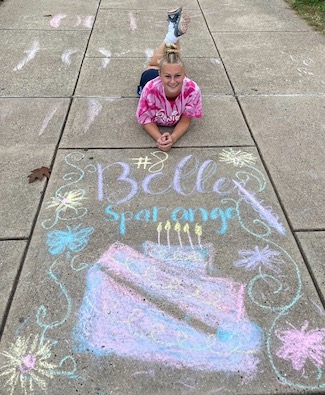
“I still have to see a fertility doctor, but luckily, it’s a very low chance of severe problems, you know others aren’t that lucky, so I would love to work with cancer patients.”
Sparango – a three-year varsity player in field hockey at North Penn - is planning to play hockey at the club level.
Listening to her coaches tell it – Sparango brings a whole lot more than just her talents to the team.
“She has always been the type of kid who’s going to give 100 percent, no matter what,” Mellow said. “She was always upbeat, always positive especially with her teammates.
“Obviously, every kid can get down on themselves. She was hard on herself but wanted to do great and give everything she could to the team out on the field. She’s one of those kids you liked having on the team because of her personality and the kid she is.”
“She’s one of the nicest kids I’ve ever coached,” McCracken said. “She loves being on a team, she’s a supportive teammate. She works really hard, she’s extremely coachable. She asks lots of questions. She’s just a super nice kid.
“I’m just so impressed with her maturity. She was out of school a lot, and I would stay in touch via email. She just always was like – ‘Things are going to be okay, I’m doing fine.’ She was just extremely positive and just a role model to her teammates.”
An inspiration to all whose path she crosses, Sparango has refused to let lymphoma define her.
“Honestly, I tried not to let it affect my personality,” she said. “It has taken so much from me, and it’s not going to take my personality at all. I could allow what it took, and I was like – ‘My personality - it’s not going to take that.’
“Honestly, now I just see it as – you can’t control what life throws at you. You can’t do anything about it, but you can control how you go about it. When I got diagnosed, I could let it break me or I could become stronger. I was like, ‘I’m going to become stronger.’ So that’s how I see it now - you can control how you deal with things that are thrown at you. Anything life throws at me – I’m ready for it. It’s not going to break me, and I’ve just got to do it.”
All SuburbanOneSports.com articles (or portion of articles) can be turned into keepsakes. For information, please click on the following link: https://www.suburbanonesports.com/article/content/turn-online-features-keepsake-posters-0086874


